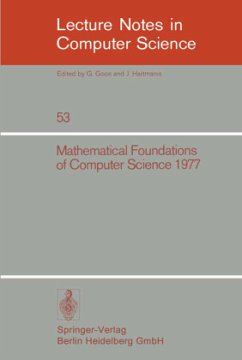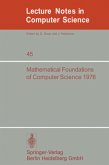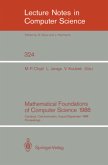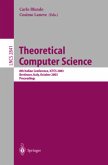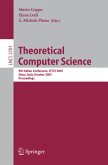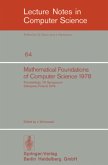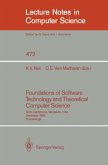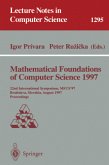On the structure and properties of NP-complete problems and their associated optimization problems.- A comparative review of some program verification methods.- Classification of the context-free languages.- Finite automaton from a flowchart scheme point of view.- A new type of models of computation.- Correctness of mixed computation in ALGOL-like programs.- Algebra and logic in theoretical computer science.- A survey of recent problems and results in analytic computational complexity.- Tree-structures for set manipulation problems.- Applied algorithmic logic.- Improved lower bounds on the number of multiplications/divisions which are necessary to evaluate polynomials.- Frequency algorithms and computations.- Graph-theoretic arguments in low-level complexity.- Properties of complexity classes a short survey.- A uniform approach to inductive posets and inductive closure.- Generalized probabilistic grammars.- Classes of structurally isomorphic np-optimization problems.- Pushdown-automata and families of languages generating cylinders.- Semantics of infinite processes using generalized trees.- Characterization of recognizable families by means of regular languages.- An algebraic approach to problem solution and problem semantics.- Complexity and minimality of context-free grammars and languages.- Comparison of the active visiting and the crossing complexities.- Arithmetical complexity of some problems in computer science.- Formal transformations and the development of programs.- Optimal rasp programs for arbitrarily complex 0¿1 valued functions.- The expressive power of intensional logic in the semantics of programming languages.- On the complexity of equivalent transformations in programming languages.- Schematology in a MJ I/T I-language OPT imizer.- Decidability (undecidability) of equivalence of Minsky machines with components consisting of at most seven (eight) instructions.- A top-down no backtrack parsing of general context-free languages.- A probabilistic restriction of branching plans.- Reducing operators for normed general formal systems.- Invariant properties of informational bulks.- Two decidability results for deterministic pushdown automata.- On the logic of incomplete information.- Measures of ambiguity in the analysis of complex systems.- Two-level meta-controlled substitution grammars.- A calculus to build up correct programs.- Another approach for proving program correctness.- Cover results and normal forms.- On a deterministic subclass of context-free languages.- Exponential optimization for the LLP(k) parsing method.- The medial axis of a simple polygon.- Semantics and proof rules for coroutine hierarchies in block-structured programming languages.- Acceptors for iteration languages.- How good is the adversary lower bound ?.- Total correctness for procedures.- A model for retrieval systems and some mathematical problems behind.- Time and tape bounded auxiliary pushdown automata.- A fast non-commutative algorithm for matrix multiplication.- Fixed-points and algebras with infinitely long expressions, I.- On languages, accepted by machines in the category of sets.- Real time computations with restrictions on tape alphabet.- The bodnarchuk metric space of languages and the topology of the learning space.- Complexity hierarchies of oracles.- Determining processes by violations.- The influence of the machine model on the time complexity of context-free language recognition.- A generalized computability thesis.- Identification of formal languages.- Correctness of recursive flow diagram programs.

